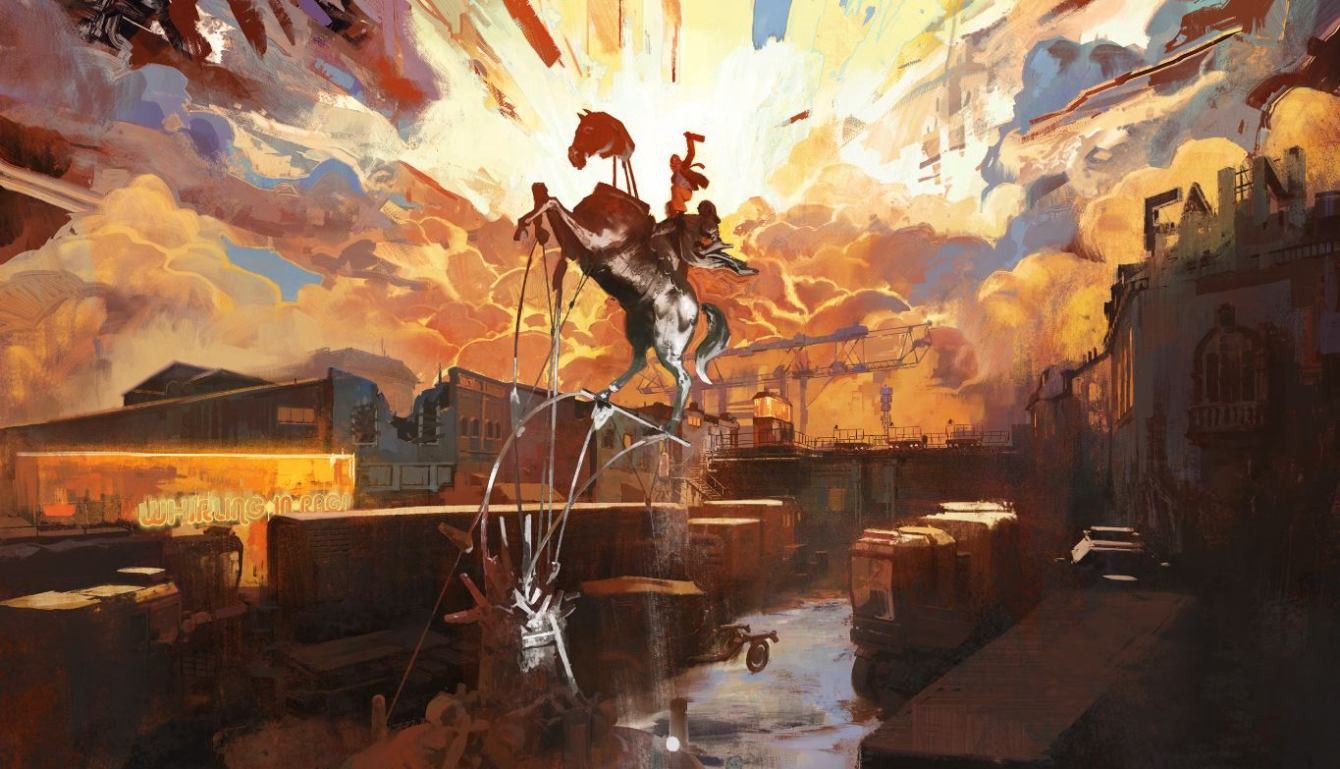Disco Elysium and the Advancement of Video Game Storytelling
Something beautiful is going to happen


Have you ever played Dungeons & Dragons? The attraction to it is palpable. Endless exploration. No walls. You can be whoever you want. In the last few years, Dungeons & Dragons has surged in popularity with a deluge of podcasts, live game shows and additional tabletop RPGs jumping into the spotlight. Over the years, many video games have tried to emulate the feeling of endless possibility that exists within the traditional tabletop RPG. Video games, for all their imagination and creativity, have very real limits. A video game has to path things, has to create them, has to give untold reason to design in order to function. Even the shoddiest Dungeon Master can one-up the possibilities within a video game by simply throwing their constructed plot out the window and allowing their player to endlessly explore the other side of reality.
Disco Elysium does not fully emulate the feeling of playing a tabletop RPG, but it’s as close as we have ever come to it.

“I Exist.”
Disco Elysium, to its best efforts, attempts to engage in player chaos and creative absurdism, all the while crafting a narrative that is so well-written and so compelling it feels as though it has actually transcended the pale boundary between video game and tabletop RPG.
Nearly every RPG you play has “skill checks” within its world. Most of these are hidden from the player and automatic — they run against stats and don’t impact the narrative whatsoever. Even games such as Knights of the Old Republic and Fallout mainstream their skill checks in a way that dilutes them, that makes the success/fail quota mete out conversational extremes that still run on a binary of good/evil.
Disco Elysium not only relishes in the chaos of its skill checks, but so fully obscures good and evil from the player that many situations end up being staggeringly different than what is expected. Critical successes or failures are not only based on an enormous amount of stats but these stats run their checks against one another, entirely changing the perception of the world, the outcome of the dialogue and actions, and the character of the player himself.
This game is not open world, and it is not limitless. Its playground is cemented within the designation of its literature, a theater of the mind that makes every new line of dialogue as satisfying as a discovered treasure chest. Conversations are progressed by player choice, but the more interesting aspect of these conversation is how the more intense or bizarre suggestions and options are locked behind these skill checks. Red skill checks are permanent and cannot be retried, while white skill checks can be by putting points into the corresponding skill when you level up. While Disco Elysium is an RPG devoid of designated combat, the block and parry of skill checked conversations keeps things exciting and keep you returning again and again to attempt the ultra difficult checks against the mysterious denizens of Martinaise.
“The funk soul brother at the back of his head has gone dark. Forever.”
An Agent of Chaos, or A Sensitive Instrument
A nameless, drunken mess of a man wakes up in darkness, harassed by his own ancient reptilian brain. Disco Elysium is a reverse detective tale, where the player must solve the mystery of their own existence while also dealing with the greater issues at hand.
There’s been a murder. Tasked with the case, Kim Kitsuragi of Precinct 57 is joined by…you, a mystery, a chaotic mess of a man who prior to the game’s beginning has destroyed his entire short term memory via an intense bender of drugs and alcohol. Somehow still cognizant enough to continue in his task, this nameless soldier of fortune must work with Kitsuragi to figure out why there’s a bloated dead man hanging from a tree behind the hotel. Over the course of the game, the mysteries entangling both the player character and the town of Martinaise cross one another in various ways, from ideology to physicality.
Martinaise is torn. A district of the country of Revachol, it is a relic of the Antecentennial Revolution, a lawless district with no core government. The Union stepped up in the years prior to the game and attempted to craft some order and unity in the area. War-torn and filled with bitter citizens who are simply trying to pick up the pieces of their lives, Martinaise is a fitting setting for the game’s chaos. Beyond solving the murder mystery, Disco Elysium is a game of outstanding worldbuilding and competing ideologies. The game is rich with political theory, and its characters run the gamut of communists, socialists, racists, fascists, liberals, punks, the homeless, veterans, and survivors.
Disco Elysium fleshes out its greater world with a bevvy of characters both real and unreal. The voice acting in this Final Cut version is phenomenal — every line is delivered with rich aplomb, and the characters truly come alive through a flurry of different accents and personalities. Disco Elysium manages to engender the richness I found in Final Fantasy XII, where the bevvy of different accents really added to the believability of the world’s greater scope.
A majority of the countries discussed in the game are a part of the Occident, a grouping that feels much like the major countries of Europe. Each country is separated by “the Pale,” which is a briefly discussed exterior boundary of nearly impassible void. The way it’s described in game makes it difficult to know if it’s a breach of psychic energy or simply an energy abyss, but passing through it causes insanity and it’s impossible for machines of flight to move between countries that are separated by the Pale. It’s a curious anecdotal aspect of Disco Elysium’s greater world that adds to the total science fiction vibe of its exterior worldbuilding, and depending on the choices you make in the game you may come up with some conversations concerning the Pale that feel eldritch in nature or would belong in Jeff VanderMeer’s Southern Reach Trilogy.

A 2mm Hole In the World
Disco Elysium is a game about loss. Not only personal loss but loss that extends into country and society. As gamers we are more than used to narratives that explore what happens after the fall of society — games like Dark Souls build their entire narrative on exploring the ruins of a destroyed country. Disco Elysium expands upon this by establishing characters with wildly opposing designs on how exactly society should continue in the wake of apocalypse. In Revachol, the communists and anarchists who defended their homeland were very nearly wiped out by a coalition of opposing countries, and the Union of Martinaise exists as less of a true union and more of a way to get people on their feet again. We are given an existentialist’s view of absurdism in a world that is teeming with cruelty.
“People are beautiful. Statuesque. Parodies and tragedies of themselves. A great democracy of creatures…”
As the drunk detective and Kitsuragi establish the players in the grand scheme of murder mystery in Martinaise, they quickly realize that solving the crime will take a lot more than investigation and detective work. They have to understand the context of the anger within the town and how the murder may have been motivated by political agenda. There’s a storm brewing among the Union members, and unraveling the mystery has more to do with ascertaining their political leanings and personal grievances than it does anything else. On Day One the player will come face to face with the “scabs” that are at the gates of the Union, the dockworkers’ strike that has transformed the city into a parking lot, the bratty kids in the back of the hotel that have been physically and mentally impacted by the war, the shopkeepers who are barely making ends meet, and the corporations who stay in Revachol purely because they believe they can wring out every last cent from the surviving populace.
The addictive daily interrogation cycle in Disco Elysium slowly unfolds not only due to solving the mystery but in what can be uncovered by simple conversations with regular people. The scope of the game is massive — the script has over a million words and supposedly over 120 of real playtime — and fed directly by its impressive worldbuilding. Even the smallest of details will return later, like puzzle pieces falling into place. The writing is truly superb, and had the novelist in me flabbergasted and jealous that such writing could exist in a video game. Despite my deep love for the JRPG, I would truly give anything to see something a la Final Fantasy reach this level of writing quality and narrative. Considering the surprise popularity of Disco Elysium over the last year and change, it’s entirely possible that we might see its influence extended into future titles.

A Different Kind Of Animal
The conversation over politics in video games has long been an exhausting one, but it’s been a conversation rarely crafted in good faith. Too often, “politics in video games” is slang for “narrative focus I do not like.” Last year we had to endure take after haggard take over The Last of Us II, and any semblance of a real and cultured conversation over that game’s narrative died in the fires of reactionary internet bros. Video games are art whether you like that or not, and the points of view established in games are entirely up to the choices of their creators. Representation in games is new, and still flawed and uneven. Actual political conversations are not actually new to gaming — you only have to look to Final Fantasy VII and its heavy-handed critique of eco-fascism and corporate greed to see a mainstream example. Still, despite all this, something in Disco Elysium just feels new, and raw.
Disco Elysium is a leftist game. While video games often have their fair share of overly vague liberal storylines that feel as though they’re reaching for a progressive agenda, Disco Elysium feels like an honest exploration into political theory. During their acceptance speech at the 2019 Game Awards, the developers of Disco Elysium, ZA/UM, gave a shoutout to Marx and Engels, authors of the Communist Manifesto. In today’s rather politically charged world, it may come as a shock to see creators so open and honest about the influences of their games, but in a way this feels necessary and refreshing. Despite the strong leftist overtones — or, perhaps, because of them — Disco Elysium’s narrative has received rave reviews and celebration. Fresh off of my first playthrough, I have to say I agree: this is one of the best narrative video games of all time.
Despite allowing the player to curve the dialogue and game experience toward being a communist, a liberal, a fascist, and more, the ideologies and characters in Disco Elysium truly explore all the tenets of leftist theory, down to full conversations over the bourgeoise and the proletariat, the ultraliberals, corporate influence, unions, labor crimes, military horrors, and more. As your drunken cop of chaos and Kim Kitsuragi slowly make their way through the war-torn streets of Martinaise, the characters you meet and talk to all feel real, their personal points of view fleshed out into impressive degrees. Disco Elysium is messy. It isn’t interested in painting its political opponents as straight villains or forcing the players into one political ideology or another. It’s narrative is crafted with such tremendous scope that it really paints a raw picture about the truth of humanity’s ugliness, and beauty.
There is nothing. Only warm, primordial blackness. Your conscience ferments in it — no larger than a single grain of malt. You don’t have to do anything anymore. Ever. Never ever.
“You are a violent and irrepressible miracle.”
The lens by which Disco Elysium views the world is colored by more than player expectation. At a million words, every playthrough will be slightly different. The game changes based on player choice, based on skill checks, based on which skills are most prominent. Earlier this year I called Kentucky Route Zero “the great American video game.” In that regard, Disco Elysium feels like it’s a great video game of the world, a narrative that doesn’t exist to force your opinion of any one thing but exists to expand your perceptions of reality. Reality doesn’t stop or end with you, in fact, reality exists within the lives of everyone and everything that’s alive, and similar to the Pale, it separates us by boundaries that we aren’t even aware exist.
Disco Elysium’s honest and brutal portrayals of mental health, war, chaos, monotony, loss, death, love and life feel like a psychology lesson at times. They’re so in-depth and so focused that I’m sure this game will not resonate with everyone. It’s uncomfortable. It’s unflinching. The investigation that runs the breadth of Disco Elysium’s narrative holds its magnifying glass to the entire human condition and not simply to one ideology or fragment of reality. In this game, thoughts are real, they’re gods or ghosts that hang off the back of the player and attempt to twist and turn them toward one avenue of idea or another. Your Thought Cabinet is your toolbox, and through it, the pains of Martinaise unfold.
Once you reach the end of Disco Elysium it’s obvious that you can’t return to a world prior to having played it. There is a vision of hope in this world — one that isn’t attached to any essential human truth, but one that is celebrated just by being alive.
“It’s not only torturous to think — to be the kind of animal us humans are. It is also an absolute pleasure and a privilege.” (Robert Kurvitz, lead writer)
